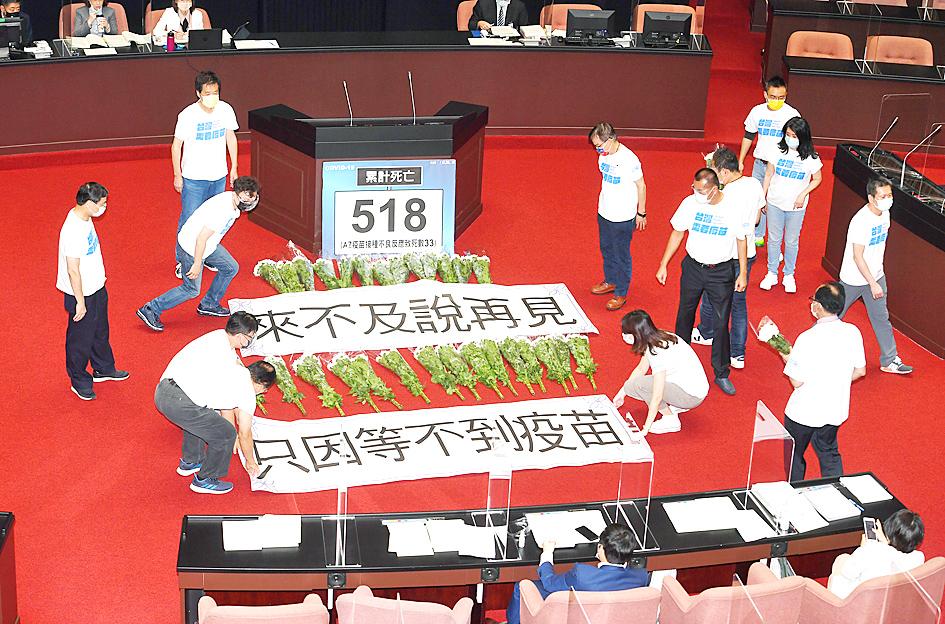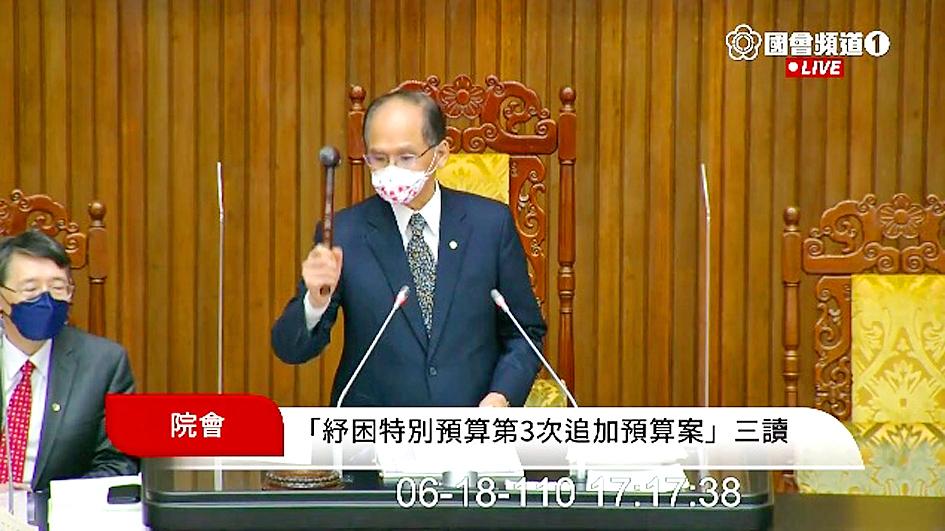Legislators yesterday approved a NT$259.49 billion (US$9.33 billion) special budget for COVID-19 relief, the fourth such measure to fund epidemic prevention efforts and provide subsidies to people and businesses affected by the COVID-19 pandemic.
The Legislative Yuan on the last day of its extraordinary session slashed NT$510 million from the NT$260 billion approved by the Executive Yuan.
The amount that was cut came out of NT$800 million proposed by the National Communication Commission, part of which was to pay for fees from a short message service (SMS) contact tracing system launched by the Executive Yuan last month.

Photo: CNA
When the system, which uses QR codes to send text messages with contact tracing information to health authorities, was announced, the Executive Yuan said that all SMS texts sent would be free, as telecoms would not charge the government.
Legislators said the commission did not need the extra funding if there were no additional costs for the texts.
The legislature also approved Chinese Nationalist Party (KMT) Legislator Lai Shyh-bao’s (賴士葆) proposal to cut NT$1 million from the Ministry of Economic Affairs-proposed NT$100 million budget for commercial operation subsidies and administrative proceedings.

Photo copied by Chen Yun, Taipei Times
The government would raise debt to fund the relief package, the Executive Yuan said in a statement.
A number of KMT proposals were turned down in the legislature, where the Democratic Progressive Party (DPP) has a majority, including proposals to purchase 40 million doses of WHO-certified vaccines within a month, and to review the contracts and prices signed by the government to procure domestically developed vaccines.
The KMT caucus’ calls to review emergency use authorization approvals for vaccines, establish a commission for compensation, and issue NT$10,000 in cash subsidies per person, NT$2.8 million to family members of those who have died from the virus and NT$150,000 to people confirmed to have contracted the disease were also rejected.
During the session, KMT lawmakers brought bouquets of white chrysanthemums, which they laid on the legislative floor in commemoration of those who died from COVID-19.
KMT Legislator Cheng Li-wen (鄭麗文) said that 518 people have died from COVID-19 in Taiwan, and their deaths would have been preventable had the government procured sufficient vaccines.
Had the government’s lax quarantine policy for returning pilots not paved the way for the most recent outbreak, and had there been sufficient hospital beds, medical equipment and medicine, so many deaths could have been prevented, she added.
The KMT caucus’ proposals are what the people need and yet they have all been turned down, she said, adding that had the government spent NT$40 billion to inoculate the entire nation, legislators would not have to approve an additional NT$400 billion on pandemic relief funds.

SHIPS, TRAINS AND AUTOMOBILES: The ministry has announced changes to varied transportation industries taking effect soon, with a number of effects for passengers Beginning next month, the post office is canceling signature upon delivery and written inquiry services for international registered small packets in accordance with the new policy of the Universal Postal Union, the Ministry of Transportation and Communications said yesterday. The new policy does not apply to packets that are to be delivered to China, the ministry said. Senders of international registered small packets would receive a NT$10 rebate on postage if the packets are sent from Jan. 1 to March 31, it added. The ministry said that three other policies are also scheduled to take effect next month. International cruise ship operators

NUMBERS IMBALANCE: More than 4 million Taiwanese have visited China this year, while only about half a million Chinese have visited here Beijing has yet to respond to Taiwan’s requests for negotiation over matters related to the recovery of cross-strait tourism, the Tourism Administration said yesterday. Taiwan’s tourism authority issued the statement after Chinese-language daily the China Times reported yesterday that the government’s policy of banning group tours to China does not stop Taiwanese from visiting the country. As of October, more than 4.2 million had traveled to China this year, exceeding last year. Beijing estimated the number of Taiwanese tourists in China could reach 4.5 million this year. By contrast, only 500,000 Chinese tourists are expected in Taiwan, the report said. The report

The Forestry and Nature Conservation Agency yesterday launched a gift box to market honey “certified by a Formosan black bear” in appreciation of a beekeeper’s amicable interaction with a honey-thieving bear. Beekeeper Chih Ming-chen (池明鎮) in January inspected his bee farm in Hualien County’s Jhuosi Township (卓溪) and found that more than 20 beehives had been destroyed and many hives were eaten, with bear droppings and paw prints near the destroyed hives, the agency said. Chih returned to the farm to move the remaining beehives away that evening when he encountered a Formosan black bear only 20m away, the agency said. The bear

HORROR STORIES: One victim recounted not realizing they had been stabbed and seeing people bleeding, while another recalled breaking down in tears after fleeing A man on Friday died after he tried to fight the knife-wielding suspect who went on a stabbing spree near two of Taipei’s busiest metro stations, Taipei Mayor Chiang Wan-an (蔣萬安) said. The 57-year-old man, identified by his family name, Yu (余), encountered the suspect at Exit M7 of Taipei Main Station and immediately tried to stop him, but was fatally wounded and later died, Chiang said, calling the incident “heartbreaking.” Yu’s family would receive at least NT$5 million (US$158,584) in compensation through the Taipei Rapid Transit Corp’s (TRTC) insurance coverage, he said after convening an emergency security response meeting yesterday morning. National